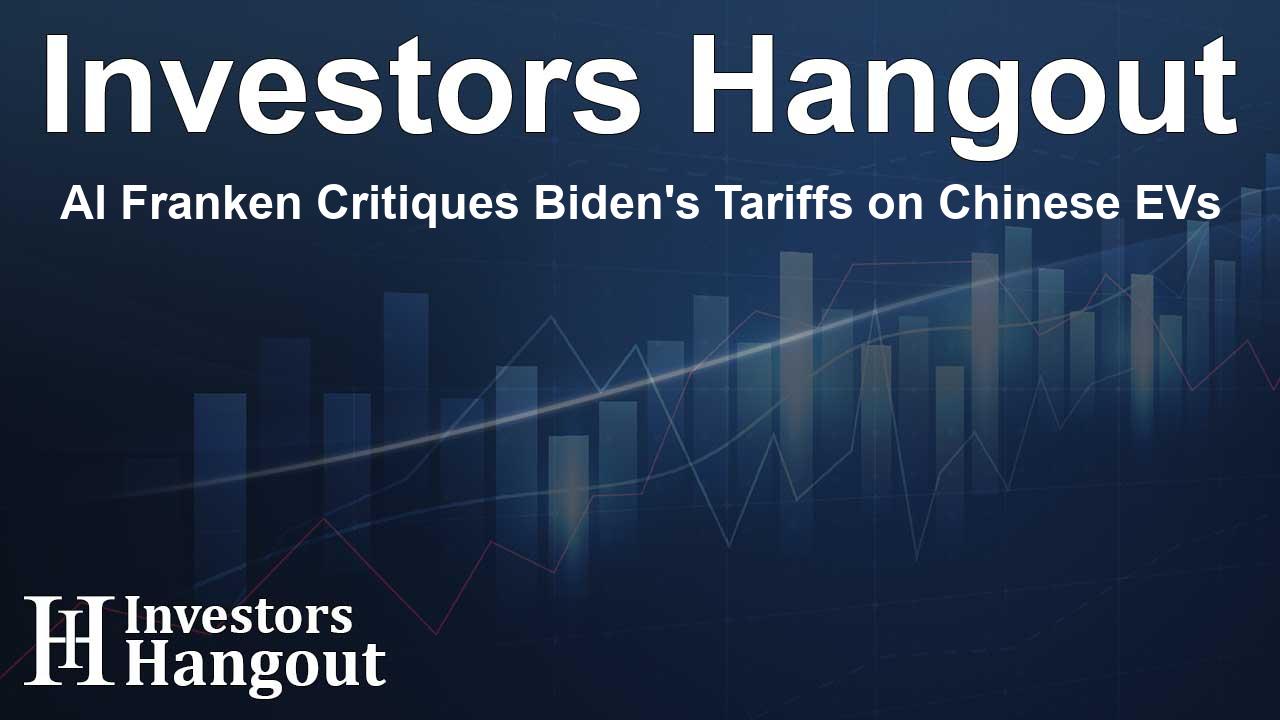Al Franken Critiques Biden's Tariffs on Chinese EVs

Al Franken Critiques Biden's Tariffs on Chinese EVs
Former Democratic Senator Al Franken recently shared his perspective on President Joe Biden's decision to impose higher tariffs on electric vehicles (EVs) manufactured in China. In a dialogue with Bill Maher, Franken emphasized the potential repercussions for American consumers.
Understanding the Tariffs
Franken explained that the burden of these higher tariffs typically falls on U.S. consumers rather than originating in China. The assertion suggests that such financial policies could backfire on American citizens, making EVs less accessible.
Bringing Context from Previous Administration
Franken's comments also resonated with past statements regarding trade policies from the previous administration. The discussion initially revolved around former President Trump's proposed 60% tariffs if elected, bringing to light the ongoing repercussions of current trade strategies.
The Economic Impact
This week, President Biden's Trade Representative announced that the tariffs, including a significant 100% duty on Chinese EVs and a 25% duty on EV batteries, are set to take effect soon. This announcement raised concerns among many stakeholders about the future prices of EVs for American consumers.
Industry Reactions
Leading companies such as Tesla Inc, led by CEO Elon Musk, have openly criticized the tariffs implemented by the Biden administration. Musk articulated that neither he nor Tesla requested these tariffs, emphasizing that such policies distort market dynamics and freedom of trade.
Concerns from Other Automakers
Ford Motor Co has also expressed concerns about the implications of proposed tariffs on essential components for EV production. The company has requested a review and potential reduction of tariffs related to artificial graphite, which is crucial for manufacturing EV batteries.
Looking Forward
As discussions continue around EV tariffs and their implications for consumers and manufacturers alike, it's clear that the industry is watching closely. Stakeholders may need to adapt to changing policies that could significantly affect market conditions.
Frequently Asked Questions
What did Al Franken say about Biden's tariffs?
Al Franken criticized Biden's tariffs on Chinese EVs, stating they disproportionately affect U.S. consumers.
How do tariffs affect consumers?
Higher tariffs generally lead to increased prices for consumers, making products like EVs less affordable.
Which tariffs are being imposed by Biden?
Biden’s administration has announced a 100% tariff on Chinese EVs and a 25% tariff on EV batteries, beginning soon.
What was Elon Musk's reaction to the tariffs?
Elon Musk criticized the tariffs, stating they were not requested and they distort the market.
Why is Ford concerned about tariffs?
Ford is worried that tariffs on artificial graphite could impact the production of EV batteries, essential for their vehicles.
About The Author
Contact Addison Perry privately here. Or send an email with ATTN: Addison Perry as the subject to contact@investorshangout.com.
About Investors Hangout
Investors Hangout is a leading online stock forum for financial discussion and learning, offering a wide range of free tools and resources. It draws in traders of all levels, who exchange market knowledge, investigate trading tactics, and keep an eye on industry developments in real time. Featuring financial articles, stock message boards, quotes, charts, company profiles, and live news updates. Through cooperative learning and a wealth of informational resources, it helps users from novices creating their first portfolios to experts honing their techniques. Join Investors Hangout today: https://investorshangout.com/
The content of this article is based on factual, publicly available information and does not represent legal, financial, or investment advice. Investors Hangout does not offer financial advice, and the author is not a licensed financial advisor. Consult a qualified advisor before making any financial or investment decisions based on this article. This article should not be considered advice to purchase, sell, or hold any securities or other investments. If any of the material provided here is inaccurate, please contact us for corrections.
